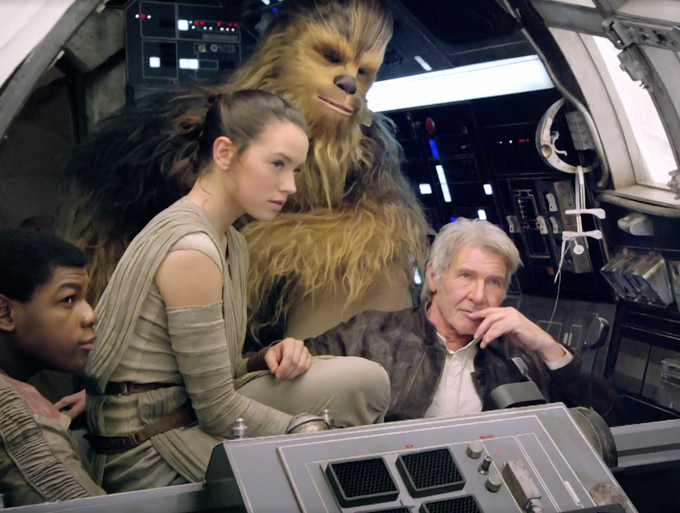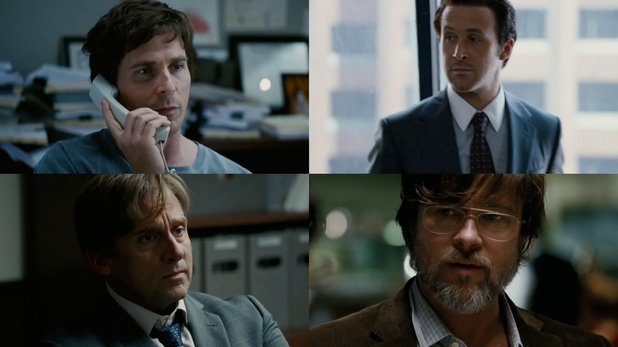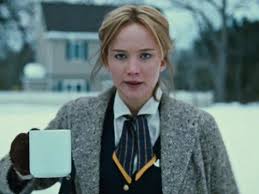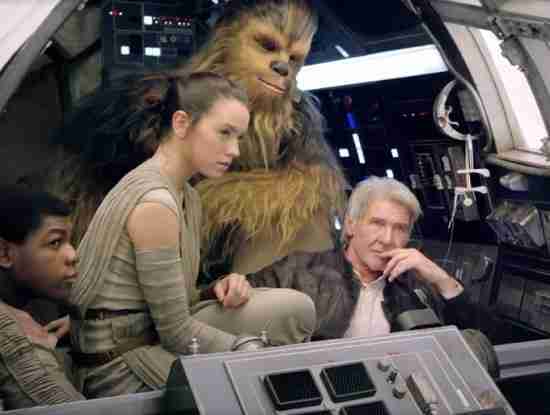Index
Fall
"Fall" here is a little deceptive in a calendrical sense as a few of these films were not in general release until after fall had passed, and others I didn't see until it was officially winter. Many of these films are "Oscar bait," prestige pictures released just before awards season so that they stay fresh in voters' minds.But before we get there . . . Combining big-screen appeal with prestige, The Martian kept the blockbusters coming while previewing a pair of franchise heavyweights, the latest James Bond offering, Spectre, and the long-awaited next installment in the Star Wars saga, Star Wars: The Force Awakens, which even Mark Watney from The Martian has probably heard about by now. Also stepping out in a big way is The Walk, from director Bob Zemeckis, while his mentor Steven Spielberg brought us another easily digestible history lesson with Bridge of Spies.

New faces join familiar ones in the galactically-conquering latest installment of the Star Wars saga The Force Awakens. You might have heard something about it already.
In fact, real persons and real history got quite a workout in 2015: Steve Jobs took an incisive look at the computer visionary while Trumbo visited a Hollywood figure whom even your grandparents might have trouble recalling, but the guy from Breaking Bad nailed screenwriter Dalton Trumbo's blacklisting during the anti-communist hysteria of the 1950s anyway. Speaking of persecution, 60 Minutes producer Mary Mapes is caught broadcasting a dubious version of the Truth about President George W. Bush's shady stint in the Texas Air National Guard during the Vietnam war, but Cate Blanchett knows how to make it work. Blanchett is getting raves for her work in Carol, but you might want to think about that one again as it's an unfortunate case of style over substance.
Real-life English gangsters the Kray twins are treated criminally in the lackluster Legend—although check out the audacious treatment the financial finaglers receive in The Big Short. Even better, though, is the painstaking investigation to expose the very highly placed criminals in Spotlight, the best movie released in 2015 that I saw this year. (Remember how I started this article by moaning about high ticket prices? I paid to see Spotlight twice.)
Room is inspired by an actual, heartbreaking event, and its first half is more intense than any big-budget popcorn-muncher such as the one featuring Jennifer Lawrence shooting arrows—although Lawrence hits the bull's eye as Joy, which continues to make the case for David O. Russell as one of America's most inspired, insightful filmmakers working today. Elsewhere, Crimson Peak is a stylish homage sure to provoke smiles of recognition from any fan of old-school horror/thriller flicks, but Youth fumbles to convey a Big Statement while sheathed in elite finery, and Sicario uses the savage consequences of the "War on Drugs" to similarly impart a hard-nosed lesson that is only partially effective.
The Big Short (2015)
How do you depict the massive fraud and hubris in the American mortgage industry that led to the 2007 global financial collapse, a topic as dry and arcane as it is dramatic and profound? If you're writer-director Adam McKay, first you make The Big Short bold and irreverent—use generous sprinkles of pop culture, such as hip, eclectic songs on the soundtrack and stunt cameos by various celebs. Then you focus your narrative on money managers Michael Burry (Christian Bale) and Mark Baum (Steve Carrell), bank trader Jared Vennett (Ryan Gosling), and former Wall Street heavyweight Ben Rickert (Brad Pitt) advising wanna-be fund managers Charlie Geller (John Magaro) and Jamie Shipley (Finn Whitrock) as they all seek to profit from what ultimately will be failure and misery experienced by unwitting shlubs who think that they can own that shining symbol of the American Dream: a home.

Don't bet the mortgage with these guys (clockwise from top left: Christian Bale, Ryan Gosling, Brad Pitt, Steve Carell), but do see the audacious The Big Short.
Adapting Michael Lewis's (Moneyball) non-fiction best-seller while changing several of the actual parties' names, McKay and co-writer Charles Randolph sketch the shorthand: Financiers had developed a new investment product, the mortgage backed security, which wraps home mortgages into a fresh bundle considered to be a low risk because—well, who doesn't pay their mortgage? Apparently a lot of homeowners, or at least they're delinquent with those payments, as Michael Burry notices at the height of the housing boom—he predicts significant mortgage-loan failures in the future. So what does Burry do? Broadcast a warning? No, he devises a credit default swap (CDS) investment strategy that he markets to banks: He offers to pay them protection for mortgages that hardly anyone expects to fail; in essence, it seems like free money for the banks—and look how Goldman Sachs laughs behind Burry's back when it agrees to his offer. However, a few other money men notice Burry's idea: Jared Vennett tips off Mark Baum's team, who at least investigates just how notoriously unstable and overinflated the mortgage-loan business is—yet they and Geller and Shipley offer their own CDSs to banks that, once mortgage defaults begin to multiply, must now repay all that "free" money. (And when the banks go bankrupt, who bails them out? Raise your hand if you pay taxes.)
Simply put, there are no heroes in The Big Short although Baum is at least a Cassandra, uncovering the fraud and fatuousness during his investigation, while former insider Rickert, now looking to live off the grid, owns the closest approximation to a conscience. And if the gory details are hard to follow—despite wacky but witty lessons from Anthony Bourdain, Selena Gomez, and Margot Robbie—McKay ensures that the broad message of greed, amorality, and venality glows like a neon dollar sign. Carrell is charismatic and Bale is enigmatic while Magaro and Whitrock come closest to an audience surrogate, but at this rarefied level of financial manipulation, can you really recognize anyone? (Would you want to?) Compelling without being preachy, The Big Short pays off dramatically with big-time interest.
Bridge of Spies (2015)
Director Steven Spielberg examines Cold War history in microcosm with Bridge of Spies; that means that he narrows its focus to certain key events, and then even ignores the scope of those events to instead concentrate on the principal individuals involved. Working from a witty, lively script launched by Matt Charman and embellished by Ethan and Joel Cohen, Spielberg chronicles, respectively, the arrest and trial of Soviet spy Rudolf Abel (Mark Rylance) and the shootdown and capture of American U-2 spy-plane pilot Francis Gary Powers (Austin Stowell) by spotlighting American lawyer James Donovan (Tom Hanks), who defended Abel and then later negotiated a prisoner exchange involving Abel and Powers.
Compressing the timeline while ignoring the big picture—the 1960 Powers shootdown exacerbated superpower tensions and escalated the Cold War, which is not even suggested here—Bridge of Spies instead paints Donovan as an integrity-bound Everyman: First, Donovan earnestly defends Abel by espousing the virtues of American justice, and then he demonstrates the art of the deal in the prisoner exchange slated to occur in Berlin, which also picks up young American student Frederic Pryor (Will Rogers), detained by the East Germans, along the way.
With a winsome family led by wife Mary (Amy Ryan), Donovan courts Capra-esque depiction—he even nurses a cold throughout the prisoner negotiation in Berlin—and hamstrung by some flippant moments at the expense of functionaries on both sides of the Iron Curtain, Bridge of Spies lacks both dimension and incisiveness; Spielberg's depiction of Cold War urgency gets a lazy, shorthand illustration through the classic turtle-centric instructional film Duck and Cover, shown to countless schoolchildren to demonstrate how to survive a nuclear attack.
Yet Hanks remains convincing throughout, his Donovan tapped as an unlikely agent whose resourcefulness and sense of decency prevail, abetted by a droll performance by stoic Rylance, while Spielberg, production designer Adam Stockhausen, and costume designer Kasia Walicka-Maimone produce the requisite period verisimilitude. (Old-movie fans will get a kick out of seeing a Berlin cinema marquee list the James Cagney Cold War comedy One Two Three as one of the features.) Still, Bridge of Spies attenuates landmark events to emphasize the personal over the political.
Carol (2015)
When Patricia Highsmith wrote The Price of Salt in 1952, its theme of lesbian love was daring and empowering, but although Phyllis Nagy's adaptation retains the novel's essence, Carol becomes a quaint period exercise in the hands of director Todd Haynes, whose debt to Douglas Sirk's sotto voce identity politics in his films made during the 1950s extends beyond Judy Becker's painstaking production design and Edward Lachman's frosty, foggy photography. Indeed, Haynes attempts to make a film that is set in the early 1950s as if it had actually been made during that time. That in turn all but ensures that the love affair between Therese Belivet (Rooney Mara) and Carol Aird (Cate Blanchett) lacks not only conviction but credibility—the make-believe is uncomfortably obvious.
This charade, then, finds Blanchett and Mara mired in affectation, with Blanchett's Carol struggling to remain urbane and glamorous amidst her domestic turmoil while Mara's Therese is not mysteriously impassive but simply, transparently passive. Before Christmas, the pair strike sparks in the department store where Therese works; Carol leaves her gloves on the counter—was it deliberate?—and rewards Therese's returning them with lunch and other incremental overtures. Carol certainly indulges this distraction—it allows her to forget about her impending divorce from estranged husband Harge (Kyle Chandler), who is battling Carol for custody of daughter Rindy; meanwhile, Therese indifferently dismisses boyfriend Richard (Jake Lacy) as she joins Carol for a Christmas road trip.
Why the road trip? Because it's in Highsmith's novel, and it's not as if the subtext between the two women isn't clear, it's that the vehicle used to provide that subtext is now cliché although Haynes tries to present it as novel. Compounding that problem is Haynes's coy veiling of their taboo (at least until the soft-core lovemaking scene), which sublimates the women's feelings into miles of rural travelogue and forces Carter Burwell's sympathetic but overworked score to carry the emotional weight. Harge's meddling sunders the women's budding affair, although that ultimately frees Therese from her creative chrysalis that Haynes touts pointedly although without much insight into her motivations. Blanchett emotes in a vacuum while Mara sports blankness and the supporters lack dimension as Carol delivers a sumptuous period tableau whose taboo is sadly counterfeit.
Crimson Peak (2015)
Fernando Velázquez's swelling, melodramatic, pervasive score is merely one indication that the gothic thriller Crimson Peak is director Guillermo del Toro's unabashed homage to classic horror films, complete with a huge, rickety mansion, Allerdale, on a desolate English moor that bleeds crimson clay; Hammer Studios would have given its eye teeth for Allerdale. Yes, film fans can suffer whiplash from spotting all the time-tested elements, but this predictable yet enjoyable terror tale, by del Toro and co-writer Matthew Robbins, remains an impressive stylistic exercise.
It helps that del Toro sets the story in a vaguely defined Victorian-Edwardian era, where American heiress Edith Cushing (Mia Wasikowska) becomes smitten by charming Sir Thomas Sharpe (Tom Hiddleston), an English baronet in America seeking funding for his clay-mining operation from Edith's father Carter (Jim Beaver), who is skeptical about Thomas's track record; also traveling with Thomas is his protective piano-playing sister Lucille (Jessica Chastain). When Carter is killed, his death at first ruled an accident, Edith marries Thomas and moves to England, although Carter's physician—and hopeful Edith paramour—Alan MacMichael (Charlie Hunnam) remains suspicious about the Sharpes, but by then Edith is isolated in a godforsaken wintry manor, seeing ghosts and apparitions and discovering disturbing clues as Lucille plies her continually with dubious tea—you can do the math from here.
Indeed, you don't have to scratch that hardened clay too deeply to find Edgar Allan Poe, Shirley Jackson, and even Alfred Hitchcock informing this recycled story, but del Toro makes Crimson Peak a visual feast with help from cinematographer Dan Laustsen, production designer Thomas Sanders, and costume designer Kate Hawley. Wasikowska remains a flat presence, but Hiddleston maintains a game face while Chastain, her Lucille a quietly chilling factor, owns the best performance. Crimson Peak offers awfully familiar thrills, but it looks terrific doing it.
Joy (2015)
Beginning as a divorced mother, Joy Mangano became a multi-millionaire by inventing the Miracle Mop, which led to her becoming a pitchwoman while patenting other clever household inventions. For Joy, writer-director David O. Russell uses Mangano's précis and Annie Mumolo's original script as a springboard through the Cinderella poverty-princess and Horatio Alger rags-to-riches fables to illustrate how a thinly veiled Joy (Jennifer Lawrence) fights to succeed against seemingly insurmountable odds as Russell weaves a compelling myth of the pitfalls and rewards of family and capitalism in modern America. Along the way, Joy crackles with incisiveness, determination, and poignancy as Lawrence delivers a powerhouse performance.
Working menial jobs, Joy struggles to provide for her two children while her family fills her house: Her mother Terri (Virginia Madsen) hardly ever leaves her room (converted from an enclosed porch) and is addicted to soap operas. Her ex-husband Tony (Édgar Ramirez), who still dreams of being the next Tom Jones, lives in the basement. And then her father Rudy (Robert De Niro), thrown out by his latest wife, moves in with her—he has to share the basement with hated Tony. At least Joy can take comfort in her grandmother Mimi's (Diane Ladd) steady encouragement, which began when Joy was a child (Isabella Crovetti-Cramp) with big dreams, albeit dreams discounted by disapproving half-sister Peggy (Madison Wolfe as a child; Elisabeth Röhm as an adult).

Forget the bows and arrows--Jennifer Lawrence hits the bull's eye as Joy, the sparkling centerpiece of director David O. Russell's latest gem.
Rudy meets wealthy widow Trudy (Isabella Rossellini), who invites the family sailing, and when wine glasses break on deck, Joy has to clean it up. While mopping up the spill, which cuts her palms when she wrings the mop-head by hand, Joy is inspired to create a durable, easily wrung, reusable mop. Setting up manufacturing in Rudy's auto-body shop, she scrapes together the capital to make a prototype and, when she convinces QVC shopping-channel executive Neil Walker (Bradley Cooper) to give her a chance, Joy manufactures an initial run—but a marketing misfire and unscrupulous sub-contractors threaten to bankrupt her and her family unless Joy can fix the situation.
With a tightrope sense of parody and pathos, Russell knows when to reel back the humor and dole out the sentiment, all while painting Joy as the resilient and resourceful center, a portrait that Lawrence fulfils in spades. Guiding cinematographer Linus Sandgren, Russell frames his evocative shots with riveting immediacy and intimacy as the sympathetic West Dylan Thordson-David Campbell score accents the period songs on the soundtrack, and familiar faces Susan Lucci, Donna Mills, and Melissa Rivers work in sly cameos. However, Russell's ending sags—it's foregone and redundant—because by then Lawrence's enthralling portrayal has made Joy an unabashed triumph; anything more is simply mopping up.
Legend (2015)
In the 1950s and 1960s, twin brothers Reggie and Ronnie Kray not only ran much of London's criminal underworld, they were celebrities for doing so, made even more legendary for their ruthlessness and brutality that stemmed from their upbringing in the tough East End. Using John Pearson's biography The Profession of Violence: The Rise and Fall of the Kray Twins as his basis, writer-director Brian Helgeland attempts to make a Legend out of the Krays' extortion and protection racket, run from their trendy nightclub, but with the brothers' sanguinary exploits already entrenched in pop culture—even Monty Python's Flying Circus spoofed them in a 1970 skit—Helgeland must try to mine their personal lives for new insight but seldom digs below the surface in an unfocused and ultimately uninvolving excavation.
Don't blame Tom Hardy, though, as he often succeeds in displaying some piquant personality portraying both brothers, psychopathic Ronnie and more socially adjusted Reggie—although both siblings are equally capable of mayhem, even against themselves. However, that's the problem with Legend: After decades of gangster chic, it's hard to produce anything fresh even if Ronnie is openly gay, with admiring if equally psychotic gunsel Teddy Smith (Taron Egerton) in tow. (Be sure to check both definitions of "gunsel"—and thank 1941's The Maltese Falcon for expanding that definition.) Reggie, though, becomes smitten with teenage Frances Shea (Emily Browning), the sister of Reggie's driver Frankie (Colin Morgan); Frances's narration informs this tired story despite their stormy marriage and other complications, which renders her voiceovers as more ill-considered storytelling.
Other familiar, if actual, characters include Leslie Payne (David Thewlis), the twins' business manager who seemingly abhors their brutality even as he continues to work for them; American gangster Angelo Bruno (Chazz Palminteri), who strikes a deal with the Krays for a piece of the London action and whose connections seem to extend to legendary mob boss Meyer Lansky; and police superintendent Leonard "Nipper" Read (Christopher Eccleston), who endures endless stakeouts and tails and even official reprimands as he dogs the Krays' every step. Tom Conroy's diligent production design and Caroline Harris's astute costuming define a gritty Swinging Sixties London, but Carter Burwell's patchwork score gets lost in the blur of overused period songs, the lazy musical shorthand that complements the lack of clarity and incisiveness in Helgeland's narrative, which namechecks a well-explored era without establishing its own imprimatur. Hardy's performances almost overcome Helgeland's limitations—almost—but this is a Legend that's been cloned, not created.
The Martian (2015)
Over the closing credits for The Martian, the saga of botanist-astronaut Mark Watney's (Matt Damon) struggle to stay alive all alone on Mars, Gloria Gaynor's disco classic "I Will Survive" fills the soundtrack: It is a reminder of the supposedly dubious musical taste of Melissa Lewis (Jessica Chastain), Watney's mission commander, and, more critically, of the glib humor that undercuts Damon's showcase performance as the lone individual compelled to overcome tremendous adversity in director Ridley Scott's well-executed if tame and predictable interplanetary suspense yarn.
Scott and screenwriter Drew Goddard, adapting Andy Weir's best-selling novel, imbue The Martian with a wealth of convincing detail as Watney is accidentally left for dead when a fierce sandstorm forces Lewis to abort their Ares team's Mars mission and return to Earth with her surviving crew. Finding himself all alone on the planet, Watney must adapt what resources remain behind to keep whole in the lethal Martian environment. Once he solves those survival basics, Watney then improvises communication with Earth, where a NASA team led by Teddy Sanders (Jeff Daniels), Vincent Kapoor (Chiwetel Ejiofor), and Bruce Ng (Benedict Wong) struggles to devise a rescue mission before Watney's food runs out, an effort that ultimately involves Lewis and her crew still returning to Earth.
The science feels legitimate, and Watney's sojourn on Mars, impressively photographed by Dariusz Wolski in Jordan's stark, severe Wadi Rum desert, quietly carries the dramatic weight capped by Watney's keen isolation. However, The Martian inevitably succumbs to the demands of plot mechanics while Scott, perhaps conscious of the relentless deathtraps in 2013's Gravity, keeps the danger level surprisingly low. Moreover, Goddard's flippant dialog curtails the narrative's urgency and stunts character development, crucially Damon's Watney, although Damon remains convincing throughout, with Daniels effective as the story's requisite heavy; meanwhile, Sean Bean, Mackenzie Davis, Donald Glover, Michael Peña, and Kristin Wiig fill supporting roles of varying importance. The Martian is entertaining if not quite world-class.
Room (2015)
The first half of Room crackles with a near-claustrophobic intimacy that then builds to a nearly unbearable tension; inevitably, though, the second half comes as a letdown, yet the emotional and psychological frisson remains vivid until the end. Emma Donoghue adapted her own novel, inspired by the abduction experience of Austrian Elisabeth Fritzl, who had birthed seven children by her own father during the 24 years he'd held her captive in a basement, to chronicle the plight of Joy Newsome (Brie Larson), kidnapped by Old Nick (Sean Bridgers) and held prisoner in his Akron, Ohio, backyard shed, where she gives birth to his child, Jack (Jacob Tremblay).
Director Lenny Abrahamson creates an evocative, constricted atmosphere in Room, which is what five-year-old Jack calls the only world he has ever known, with only a television and a small skylight with which to contrast the confinement in the small shed offering only the most basic essentials for survival. Somehow keeping sane amidst such extreme conditions, Joy manages to raise him as normally as she can—she cannot cut his hair because scissors would be a weapon—while having to endure Nick's periodic carnal visits, during which Jack must sleep in Wardrobe. But following a fight with Joy, Nick cuts the power and heat as punishment, although that inspires Joy to make Jack look sick enough from the cold to fool Nick into taking him to the hospital. The ploy fails, but then she and Jack pretend that Jack had died from that neglect: In her supposed grief, she rolls Jack up in their rug for Nick to then haul away, which triggers Room's nail-biting climax.
It's a climax that comes too soon, for although mother and son are rescued, their acclimatization cannot help but dissipate the opening intensity even if all is not rosy: Joy's parents Nancy (Joan Allen) and Robert (William H. Macy) are divorced—Nancy now lives with old family friend Leo (Tom McCamus)—while Robert cannot accept Jack, who along with Joy discovers restrictions even in the wide-open world that includes Joy's old middle-class comforts in suburbia. Legal and financial issues darken the periphery of their recovery, and when Joy is interviewed on television, the presenter's (Wendy Crewson) questions eventually suggest a blame-the-victim air. But although Room's second half falters fitfully, Abrahamson and cinematographer Danny Cohen maintain a tense stillness abetted by Stephen Rennicks's quietly perceptive score. However, the final triumph belongs with Larson's and especially Tremblay's tremendous performances, which remain moving long after the credits are done.
Sicario (2015)
Violence in the Mexican drug war has become pervasive and horrifically brutal, and Sicario pulls no punches in portraying that mayhem: When Federal Bureau of Investigation agents Kate Macer (Emily Blunt) and Reggie Wayne (Daniel Kaluuya) lead a paramilitary-style raid on a suburban Arizona home, they make a gruesome discovery—numerous corpses concealed in the walls and an exploding booby trap in a shed. The home belongs to Sonoran drug lord Manuel Diaz (Bernardo Sarachino), and when Kate is invited to join a task force pursuing Diaz, she is ushered into the current environment of the "War on Drugs" on an entirely unforeseen level.
That is the set-up Taylor Sheridan's hard-nosed script delivers and that director Denis Villeneuve executes with effective suspense and intimacy, which at times can become unbearably intense: witness a daytime incursion into Juarez, Mexico, which resembles nothing but an urban landscape engulfed in a civil war, to exfiltrate a Diaz lieutenant—the operation eventually triggers a white-knuckle border shootout. Leading the task force are cagey Matt Graver (Josh Brolin) and shadowy Alejandro Gillick (Benicio Del Toro), both of whom know far more than they are telling Kate, particularly when Kate tries to bust a money-laundering operation linked to Diaz whose tentacles extend into American law enforcement. But that is peanuts compared to the ultimate enforcement goal while Alejandro's true identity is similarly shocking.
As the earnest naïf thrown into international parapolitics that evince dubious morality, Blunt must display impotent outrage while Brolin delivers the lowdown and Del Toro gets to play the deadly enigma; his is easily the most compelling performance in Sicario. Villeneuve can generate suspense, and with talented cinematographer Roger Deakins he delivers beautifully framed scenes in the stark Southwestern desert while Jóhann Jóhannsson's percussive score is suitably ominous. But the style supplants the substance—Sicario feels too much like an exercise and not a full-bodied story, tension with no satisfying release.




Comments powered by CComment